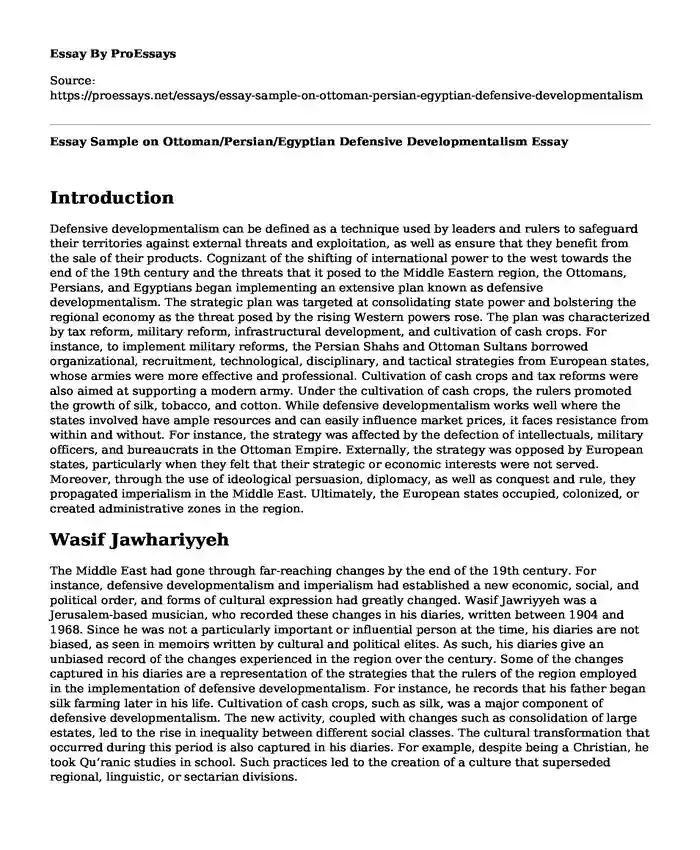Introduction
Defensive developmentalism can be defined as a technique used by leaders and rulers to safeguard their territories against external threats and exploitation, as well as ensure that they benefit from the sale of their products. Cognizant of the shifting of international power to the west towards the end of the 19th century and the threats that it posed to the Middle Eastern region, the Ottomans, Persians, and Egyptians began implementing an extensive plan known as defensive developmentalism. The strategic plan was targeted at consolidating state power and bolstering the regional economy as the threat posed by the rising Western powers rose. The plan was characterized by tax reform, military reform, infrastructural development, and cultivation of cash crops. For instance, to implement military reforms, the Persian Shahs and Ottoman Sultans borrowed organizational, recruitment, technological, disciplinary, and tactical strategies from European states, whose armies were more effective and professional. Cultivation of cash crops and tax reforms were also aimed at supporting a modern army. Under the cultivation of cash crops, the rulers promoted the growth of silk, tobacco, and cotton. While defensive developmentalism works well where the states involved have ample resources and can easily influence market prices, it faces resistance from within and without. For instance, the strategy was affected by the defection of intellectuals, military officers, and bureaucrats in the Ottoman Empire. Externally, the strategy was opposed by European states, particularly when they felt that their strategic or economic interests were not served. Moreover, through the use of ideological persuasion, diplomacy, as well as conquest and rule, they propagated imperialism in the Middle East. Ultimately, the European states occupied, colonized, or created administrative zones in the region.
Wasif Jawhariyyeh
The Middle East had gone through far-reaching changes by the end of the 19th century. For instance, defensive developmentalism and imperialism had established a new economic, social, and political order, and forms of cultural expression had greatly changed. Wasif Jawriyyeh was a Jerusalem-based musician, who recorded these changes in his diaries, written between 1904 and 1968. Since he was not a particularly important or influential person at the time, his diaries are not biased, as seen in memoirs written by cultural and political elites. As such, his diaries give an unbiased record of the changes experienced in the region over the century. Some of the changes captured in his diaries are a representation of the strategies that the rulers of the region employed in the implementation of defensive developmentalism. For instance, he records that his father began silk farming later in his life. Cultivation of cash crops, such as silk, was a major component of defensive developmentalism. The new activity, coupled with changes such as consolidation of large estates, led to the rise in inequality between different social classes. The cultural transformation that occurred during this period is also captured in his diaries. For example, despite being a Christian, he took Qu’ranic studies in school. Such practices led to the creation of a culture that superseded regional, linguistic, or sectarian divisions.
Conclusion
The rise of imperialism, as well as the conflict it elicited, is also seen in his work. For instance, his performance of Western plays, such as Romeo and Juliet, was seen by some elites as another form of Western imperialism and corruption. Regardless of this, the rise of Western influence is seen throughout his diaries. Having lived through these changes, and having no reason to lean towards any side unjustly, Jawhariyyeh’s diaries adequately reflect the changes that occurred in the 19th century the Middle East.
Cite this page
Essay Sample on Ottoman/Persian/Egyptian Defensive Developmentalism. (2023, Sep 25). Retrieved from https://proessays.net/essays/essay-sample-on-ottoman-persian-egyptian-defensive-developmentalism
If you are the original author of this essay and no longer wish to have it published on the ProEssays website, please click below to request its removal:
- Blacks and the Constitution Essay Example
- The Fiscal and Monetary Policy Essay Example
- Research Paper on Kamikazes In The World War 2
- Essay Sample on The Battle of Natural Bridge
- Paper Example on Twelfth-Century Renaissance: Bridging Middle Ages & Modernity
- Essay Sample on Iraq War: U.S. Blamed Iraq for WMDs, But Allegations Proven False
- US 2020 Elections - Essay Example







